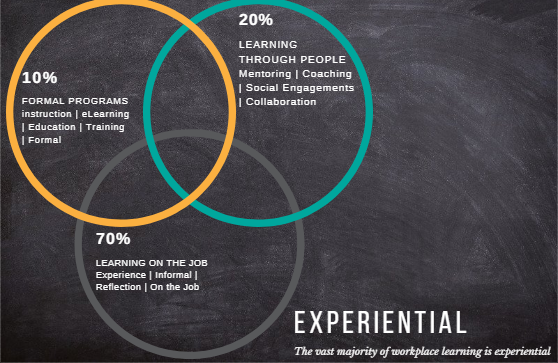
By Steve Catania
In this final entry of the series on the 70/20/10 model, we turn our attention to the 70%, which focuses on experiential learning. Previous entries touched on the 10% of the model focused on structured learning and the 20% of the model focused on social learning. As a human resource or payroll professional on the UW–Madison campus, experiential learning is the most frequent way of acquiring and developing your knowledge and skills. It generates the most benefits for you as an employee and for the university. Unfortunately, when experiential learning happens on the job, it too often is an isolated occurrence, rather than part of a larger development plan.
Thinking back to the house-building lecture introduced in the first entry, we discussed its failure to connect the information learned in the lecture to any hands-on activities. The same is true for on-the-job learning at the University of Wisconsin–Madison. While attending a training session or getting involved with a community of practice are beneficial, taking what you learn during those activities and applying it on the job magnifies the impact.
Some common ways to help experiential learning occur so that an employee can apply their existing skills and knowledge for the benefit of the organization, while also stretching to learn new skills to prepare for future opportunities, include:
- Increasing the scope of one’s work
- Engaging in project-based learning
- Participating in new organization-wide initiatives
Before, during, and after experiential learning, individuals should reflect on the knowledge they can, or have, acquired through the process. Be sure to focus on how the new skills and knowledge can help the employee better perform their daily roles and responsibilities.
For maximum success, employees and managers should collaborate to identify experiential opportunities in the work environment. Consider the following questions:
- What have you learned from attending a formal HR training program? How can you apply what you have learned back on the job?
- Could you teach another person how to complete a task or activity that you do in your role as a human resource or payroll professional?
- How could you complete special projects and ask for opportunities to be included on projects affecting your team?
- Could you actively participate in a committee or campus-wide initiative?
For HR personnel and managers, it is important to be open-minded if an employee suggests an experiential learning opportunity. Ask the employee what they plan to learn, how it fits with their larger professional development, and how to ensure coverage of their own job responsibilities during the experiential learning opportunity.